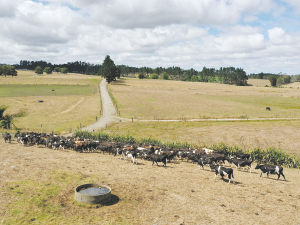Forest & Bird launches 2025–2026 Summer Adventure Challenges for all ages
Forest & Bird's Kiwi Conservation Club is inviting New Zealanders of all ages to embrace the outdoors with its Summer Adventure Challenges.
 All farmers have to be careful in the sun but farmers in more northern parts of the country experience higher UV radiation for longer.
All farmers have to be careful in the sun but farmers in more northern parts of the country experience higher UV radiation for longer.
With summer around the corner, farmers are being urged to take steps to lower their risk of skin cancer.
People who work outside receive up to 10 times more UV radiation exposure than indoor workers, putting them at higher risk of developing skin cancer, according to the Cancer Society.
It says not everyone realises the hidden hazard of over-exposure to ultra-violet (UV) radiation.
Additionally, items that can protect you from UV radiation, like sun protective clothing, sunscreen, hats, and sunglasses are tax deductable for farmers who are self employed.
Cancer Society medical director Dr Kate Gregory says skin cancer is the most common cancer in Aotearoa New Zealand.
"Fortunately, we now know that there are things we can do to lower our risk. It is important that we embed SunSmart practices in our lives from a very young age as UV damage accumulates over time.
"Also, if you are working outside, it is essential that you take steps to protect yourself from UV radiation. It i never too late to start.
"These actions can make a real difference in reducing the risk of skin cancers."
Otago Farmer Jeremy Wales, from Baldwin Farm, in the Knobbie Range has been farming for 24 years. Generally a man of few words he still wants to spread the message of taking care while working outdoors. "The sun is hard and hot in Central, and you don't want to get done over by skin cancer! Cover up, wear a hat, and put your sunnies on."
Gregory notes that most skin cancers can be treated successfully if caught early.
"It is so important for everyone, particularly those spending large amounts of time outdoors, to regularly check their skin.
"And remember that you cannot see or feel UV radiation - it can be harmful even on a cool or cloudy day. Because UV damage accumulates over time, we recommend that farmers use sun protection all day.
"Be particularly careful from the beginning of September to April between the hours of 10am-4pm when UV levels are highest."
All farmers have to be careful in the sun but farmers in more northern parts of the country experience higher UV radiation for longer.
Tips When Out on the Farm
Wear items that can protect you while outdoors. Depending on the requirements, this could include:
Tony Aitken, chief executive of Ruralco, has been awarded the Excellence in Business Leadership Award at the ANZ Business of the Year Awards.
Global trade has been thrown into another bout of uncertainty following the overnight ruling by US Supreme Court, striking down President Donald Trump's decision to impose additional tariffs on trading partners.
Controls on the movement of fruit and vegetables in the Auckland suburb of Mt Roskill have been lifted.
Fonterra farmer shareholders and unit holders are in line for another payment in April.
Farmers are being encouraged to take a closer look at the refrigerants running inside their on-farm systems, as international and domestic pressure continues to build on high global warming potential (GWP) 400-series refrigerants.
As expected, Fonterra has lifted its 2025-26 forecast farmgate milk price mid-point to $9.50/kgMS.
OPINION: Staying with politics, with less than nine months to go before the general elections, there’s confusion in the Labour…
OPINION: Winston Peters' tirade against the free trade deal stitched with India may not be all political posturing by the…